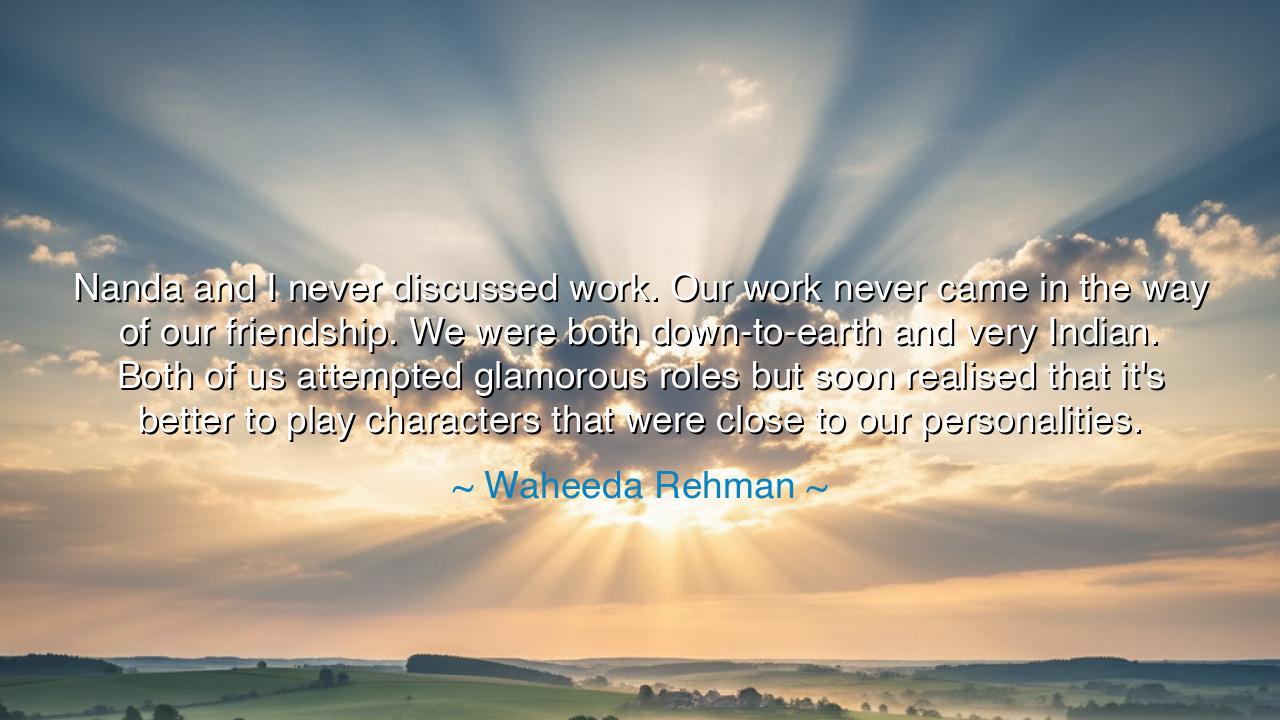
Nanda and I never discussed work. Our work never came in the way
Nanda and I never discussed work. Our work never came in the way of our friendship. We were both down-to-earth and very Indian. Both of us attempted glamorous roles but soon realised that it's better to play characters that were close to our personalities.






In the delicate balance of human relationships, few bonds are as precious as true friendship—a connection that transcends the professional, the superficial, and the fleeting. Waheeda Rehman’s words, "Nanda and I never discussed work. Our work never came in the way of our friendship. We were both down-to-earth and very Indian. Both of us attempted glamorous roles but soon realised that it's better to play characters that were close to our personalities," reveal the sacred nature of a friendship that remains rooted in genuine connection rather than career ambitions. Rehman speaks not of the pressures of the film industry or the competitive world they inhabited, but of a relationship founded on mutual respect and authenticity. Their friendship was not tainted by the artificial constructs of success, but nurtured by the simplicity of being true to themselves, grounded in their shared values and roots.
In the ancient world, the philosophers understood that true friendship was not born of self-interest or external rewards, but from a shared understanding and genuine affection. The Greeks distinguished between the friendships of utility, those formed out of necessity, and the friendships of virtue, which were built on shared values and morality. Aristotle believed that the highest form of friendship was one where both individuals sought the good of the other, not for personal gain but because their connection was rooted in shared virtue and honesty. This is the friendship that Waheeda Rehman speaks of, a bond with Nanda that was rooted in their true selves rather than in the superficial roles they played in the world of cinema.
The ancient Romans, too, understood the importance of authenticity in relationships. Cicero, in his famous treatise De Amicitia ("On Friendship"), argued that true friendship was founded on mutual respect and sincerity, not on appearances or status. He believed that a friendship that was based on virtue and genuine connection could withstand any external pressures, be they social, political, or even professional. In this light, Rehman’s reflection on her bond with Nanda reflects the Roman ideal: that friendships should not be defined by the roles we play in the world, but by the authenticity of the human connection. Their friendship was grounded not in their roles as glamorous film stars, but in their shared down-to-earth nature, their Indian roots, and their willingness to remain true to themselves.
Consider the relationship between Socrates and his companions, Plato and Xenophon, who revered him not for his material achievements or external status, but for his wisdom and the authenticity of his character. Despite being a philosopher who questioned the foundations of Athenian society, Socrates formed deep friendships based on truth and virtue. These friendships were not based on any benefits Socrates could offer in terms of power or wealth, but on the shared journey toward wisdom and self-understanding. Just as Socrates maintained his friendships through honesty and simplicity, so did Rehman and Nanda choose to nurture a bond that transcended the superficial aspects of their profession. Their friendship was marked not by the glamour of their roles, but by the integrity they both brought to their work and to their personal lives.
The essence of Rehman's statement also speaks to a profound understanding of identity. She and Nanda both tried to play glamorous roles, but over time, they came to the realization that it was better to align their characters with their true personalities, as this brought them both greater peace and fulfillment. The ancient concept of know thyself, attributed to Socrates, calls for an understanding and acceptance of one's own nature, so that one may live in harmony with it. Rehman and Nanda’s decision to embrace roles that reflected their true selves rather than the glamour the industry often demanded was not just an artistic choice but an expression of their self-awareness and honesty.
The lesson here is profound and timeless: the greatest friendships are not built on external accomplishments or the roles we play in the world, but on the authenticity and virtue we share with others. When we choose to build relationships based on truth, respect, and a genuine connection, we create bonds that can withstand the superficialities of the world around us. The success of Rehman and Nanda’s friendship was not found in their professional achievements or public image, but in the simplicity and genuineness of their relationship.
In your own life, seek to nurture friendships that are grounded in authenticity and honesty. Do not be swayed by the superficial roles that society or work may impose on you, but rather, build connections that reflect your true nature. Just as Rehman and Nanda found greater fulfillment by choosing roles that were aligned with their own personalities, so too should you choose relationships that resonate with your true self. By doing so, you will find that the bonds you create will be the most enduring, those that withstand the trials of time and circumstance. True friendships are not those built on the shifting sands of glamour or status, but on the firm foundation of mutual respect, shared values, and the simple, enduring beauty of being authentically human.






AAdministratorAdministrator
Welcome, honored guests. Please leave a comment, we will respond soon